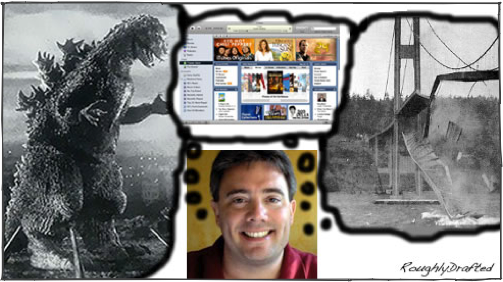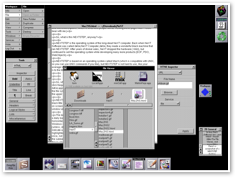





According to proponents of this myth, Apple's iTunes Store has a monopolistic lock on digital music, and at the same time is also a marginal failure that nobody is using. Judging from headlines that appear next to each other, it's hard to keep the FUD straight. In both cases, they're wrong, here's why.
Monopoly...?
Has Apple has erected an impenetrable barrier to competition in digital content? Apple's majority market share in music players with the iPod, and in legal downloads in the iTunes Store is frequently compared to Microsoft's monopoly position in the PC operating system market throughout the 90’s.
Paul Thurrott recently chimed in to observe "If Microsoft can serve as a lesson, and they should, Apple should be stopped before the abuses get too great and harm too many consumers. That the US DOJ is publicly defending this company and its practices in Europe is, of course, insane."
Oh the humanity! These jokes write themselves!
...or Failure?
Nearly in the same breath, analysts were falling all over themselves to frame data from Jupiter Research that suggested that the average iPod user does not, as Napster attempted to advertise, spend $10,000 filling an iPod with iTunes downloads. 





In fact, Jupiter reported the average iPod user in Europe had only bought 20 tracks from iTunes. That sounds reminiscent of the man who drowned while crossing a river that was an average of six inches deep.
Let's take apart both myths, which are actually two sides of the same coin. First:
iTS Not A Monopoly
Remember that Microsoft wasn't judged a monopoly based on its market share, but rather due to an inability for others to enter the PC operating system market due to the Microsoft price paradox. Windows wasn’t sold, it was bundled.
Even today, Microsoft reports that 80% of its sales come from licensing agreements with hardware vendors, rather than retail sales to consumers. The market isn’t choosing to buy Windows over competing operating systems; even Linux is struggling to maintain a scrap of the PC installed base, and Linux is available for free.
A monopoly does not refer to the popularity of a product, but rather the control of a market. For example, GM does not have a monopoly in selling the Cadillac Escalade. GM wouldn’t even have a ‘monopoly in SUVs’ if the Escalade claimed 80% of that market. It would have monopoly only if consumers could not drive around without buying an Escalade from GM, and no other auto makers could offer competing cars for sale at market prices.
Markets exist to set fair prices. If prices get set too high, buyers tend to hold onto their money, and competitors emerge to offer either better or cheaper products. If prices fall too low, sellers either withdraw from the market or introduce better products designed to entice consumers to pay a premium.
Monopolies as a Utility
In some cases, a free market creates more problems that it solves. Monopolies are often granted to telephone, cable, and power utilities because the rapid changes inherent in a free market would create a lot of risk. Imagine a cheap power company signing up half of a city for power, then choosing to withdraw from the market!
Cities grant monopolies to mitigate against such risks. Like these utilities, Microsoft's monopoly in PC operating systems offered some positive advantages. It was not merely an evil plot to control the universe, but also a rational response to the PC industry's demand for a functional and safe place to do business.
By providing an acceptable product that filled a need, Microsoft found success; the PC industry, in large part, granted Microsoft a monopoly to mitigate risk in PC software development.
The American telephone system operated for decades as a benevolent dictator, introducing rapid advances in new technology. Like other Communist plans, it lost its way in the 60’s and began to fall behind the rapid pace of technological progress being developed by competitive, free markets.
This resulted in the AT&T monopoly eventually being dismantled to create a free markets for local phone service, long distance, telephone equipment, and data services where rivals could compete.
Similarly, as the 90’s progressed, it became clear that Microsoft wasn’t operating its monopoly in the interest of consumers.
Instead, Microsoft used its monopoly position to destroy competition in other markets: office applications, the web and java as development platforms, syndicated distribution, digital media, video games, phones and PDAs, and anything else it could target.
Microsoft was pretending to compete in free markets while really using its monopoly position to avoid competition and prevent real markets from emerging. A primary negative aspect of Microsoft’s position came from its exclusive agreements with PC makers, which destroyed any potential for competition or alternatives.
Since Microsoft didn’t have to compete in a free market, it wasn’t driven to offer better products or offer fair prices. That not only hurt consumers and growth in the industry, but ended up hurting Microsoft by saddling the company with noncompetitive, dead end technology, just like AT&T decades earlier.
Safety vs. Risk
As I presented in the series of articles on the Rise and Fall of Platforms, the market sometimes avoids choice because of the risks involved. This kills competition for products that may be technically superior, but simply can't establish a sustainable share of the market because they involve too much perceived risk.
 The Dvorak keyboard and the NeXTSTEP operating system are two easy examples. In both cases, only a relatively small number of users took the risk to try something new, despite the potential for significant rewards.
The Dvorak keyboard and the NeXTSTEP operating system are two easy examples. In both cases, only a relatively small number of users took the risk to try something new, despite the potential for significant rewards.Users and developers don't support different products in the market just for diversity's sake; both are motivated by utility, price, and profits.
For example, Apple's Newton was a fun product, but it didn't offer enough utility to justify its price premium over US Robotics' Palm Pilot, so users didn't buy it.
Limited Newton sales couldn't support Apple's ongoing development of the device, or foster enough support by third party development to woo users into examining the Newton's advantages. That created a vicious death spiral that killed the product.
For a software platform, the size of its installed base and the expense of development are critically important to its survival. The expense of producing and maintaining cutting-edge software demands either:
-
•vertical markets for high priced custom development, or
-
•broad, horizontal markets that can support lower consumer prices.
Potential competitors to Windows weren’t stymied by Microsoft’s market share as much as the barrier to entry posed by the expense and complexity of software development, and the lack of any competitive marketplace. Microsoft wasn’t selling more retail boxes; it avoided the market by bundling its software with PC sales.
Content vs. Software
However, in the case of digital media, content has no platform specific development costs. Apple's Fairplay and Microsoft's WMA use the same content with different wrappers.
The scarcity and expense of software development, which for example prevents AutoCAD from porting its complex software to the Mac or to Linux, is not at all comparable to simply wrapping up songs from Regina Spektor in multiple flavors of DRM.
Compared to building an operating system and maintaining it as a platform, it is simply trivial for anyone to license and produce content that will play on a given platform of devices.
Apple has no monopoly position that denies competitors from offering similar products. The iPod is sold on retail shelves next to competing players. Apple didn’t dump iPods upon the public as loss leaders, consumers voted with their dollars.
Similarly, iTunes software wasn’t tied into a monopoly operating system for anticompetitive distribution; it was sought out and downloaded by most users in the same manner as the Firefox browser.
A range of players using Microsoft's WMA, Real's Rhapsody, or Sony's ATRAC were all failures in the marketplace not because they couldn't play Apple's iTunes/Fairplay music, but rather because they built stores that were terrible.
Likewise, there is no scarcity of WMA content that is holding back WMA players. Rather, they are simply not selling because they are poorly built, and poorly marketed, and have a feature mix that gets all the details wrong. They fail to provide what consumers demand or anticipate features they will find useful.
Nails in the Coffin
Further, since music is also available on CD, there is absolutely no content market barrier at all in introducing new competition in hardware players. Anyone suggesting that the iPod or iTunes Store is a monopoly simply does not understand the term.
If anything, the iPod is a monopoly killer, because it prevented the world from being stuck with a single source of content at the whim of Microsoft and the RIAA, both of which demonstrated a gross disregard for consumer fair use rights and sought to raise download media prices to absurd levels.
The reason Thurrott wants governments to get involved in the digital music market has nothing to do with ‘harm to consumers.’ Rather, he knows that a government mandate is the only thing that could force adoption of WMA following its spectacular failure in the marketplace.
The fact that a billion and a half songs have been sold through Apple’s iTS does indicate that a significant number of people have invested in Apple's platform. But iTunes represents no more of a monopoly in digital music than the game World of Warcraft does among MMORPGs.
Simple popularity and the inability of competitors to introduce rival products that can compete or gain as much market share do not make a monopoly.
What about the second half of the myth: is iTunes a failure because the average user in Europe had only bought twenty iTS tracks? Take a look at the facts in the next article.
This Series

| | Comment Preview
 Read more about:
Read more about:

 Send |
Send |

 Subscribe |
Subscribe |
 Del.icio.us |
Del.icio.us |
 Digg |
Digg |
 Furl |
Furl |
 Reddit |
Reddit |
 Technorati
Technorati
Check out the Daily Show Multi-Pass on iTunes.com
Click one of the links above to display related articles on this page.
The iTunes Monopoly/Failure Myth
Thursday, September 21, 2006






Ad













